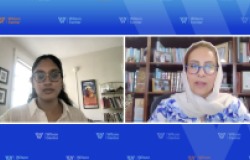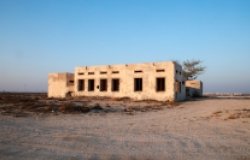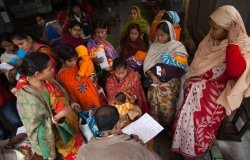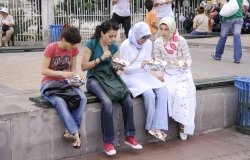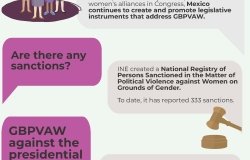Pharmaceutical Pioneers: Female Pharmacists in Dakar, Senegal
A presentation by Donna A. Patterson , Africanist Doctoral Candidate Fellow at the Wilson Center's Africa Program. Patterson will present an excerpt from her dissertation research, which examines the intersection of gender and professional development among female pharmacy owners in Dakar, Senegal.
Overview

 Donna Patterson Africanist Doctoral Candidate Fellow
Donna Patterson Africanist Doctoral Candidate Fellow
Moderator: Howard Wolpe, Director, Africa Program
Donna Patterson's presentation took aim at many of the common stereotypes about the roles that women can and do play in economic development. Much scholarship has been devoted to demonstrating the hardships that women face when engaging in entrepreneurial activity in developing regions. Women are often described as lacking access to credit and loans, attaining lower levels of educational opportunity and achievement, being forced to limit their activities to the informal sector, and relying on illicit trade and transactions. However, Patterson highlights a case study that serves as a notable exception to these commonly reported conditions, based on her research in Dakar, Senegal.
Senegal is a predominantly Islamic country, and is generally considered one of West Africa's most open societies. Nonetheless it is highly patriarchal and sorely underdeveloped. However, in and around the capitol, Dakar, there has been an unusual phenomenon—women have come to be the predominant force in the pharmaceutical retail market. Patterson reports that nearly two out of three pharmacies in central Dakar are owned and operated by women, with only slightly lower proportions in outlying areas. Throughout Senegal, women own 48% of all pharmacies, and this number appears to be increasing.
These women are generally highly educated, frequently (with some exceptions) married to someone who is not in the healthcare profession, and have between three and four children on average. They also frequently own property in their own name, often the land on which the pharmacy is constructed, the actual merchandise in the store, a personal or family home, or some combination of these. Furthermore, female pharmacists are more likely than their male counterparts to own the pharmacy in which they work. Patterson illustrated this demographic information with three concrete examples of very successful female pharmacists who had revolutionized the industry. One had become president of a trade group of pharmacy owners, a second had decided to keep her pharmacy open until midnight (rather than the usual 5 pm closing) and a third had introduced a number of non-pharmaceutical products including shampoos and makeup.
Patterson put forward several possible explanations for female success in this field. Senegal's education system has typically been one of the most successful in West Africa, and somewhat more open to women. This has meant more opportunities to achieve the difficult graduate-level degrees necessary to practice pharmacy in Senegal. Another factor in their success has been the longstanding association between women and traditional medicine, which has bolstered public confidence in female pharmacists. This is especially important in Senegal, where a visit to the local pharmacist often serves as an informal alternative to a trip to the doctor's office. The most remarkable explanation that Patterson provided was that many of these highly educated women did, in fact, have access to credit and loans in order to open up their own pharmacies. Furthermore, this credit was not obtained through informal micro-credit organizations (tontines), often cited as essential for females to secure access to entrepreneurial capital in the developing world. Instead, some female pharmacists sought and received loans from family members, but most received at least a portion of their capital from formal institutions: banks and corporations specializing in the pharmaceutical sector.
Patterson concluded with a discussion of the prospects of continued success of women in this field, and the profitability of the industry in general. Obstacles include the lingering effects of the 1994 devaluation of the CFA, which hurt many pharmacists paying off long-term loans, the growing number of competing pharmacies in Dakar due to relaxed zoning regulations, and the multi-million dollar international black market for medicine. In order to meet these challenges, Patterson suggests that individual female pharmacists must continue to emphasize their relationships with their customers and develop customer loyalty, advertise in a competitive marketplace and diversify their product lines to include convenience items and toiletries (such as can be found in many American pharmacies). On an industry-wide scale, pharmacists must lobby for increased regulation of the illicit pharmaceutical market and exchange ideas and strategies with pharmacists abroad.
The success of women in this industry is crucial for several reasons, according to Patterson. These women offer Aid agencies a potentially useful healthcare distribution network as an alternative to the general focus on doctors as the primary mode of healthcare delivery. She identified the decision by USAID to use pharmacists to promote condom use as an example of how the informality of these female pharmacists can help achieve development goals. Pharmacists' relationship to the community can also provide political mobilization in support of locally produced generic medicine. Lastly, the "feminization" of the pharmaceutical market has given women a voice in both local and global health policy.
Patterson fielded questions from the audience, which focused on several themes, including the extent to which this phenomenon is repeated in other countries and industries. Patterson responded that while the success of females in Senegal is an outlier among African and Islamic countries, and these successes are not mirrored in other industries within Senegal, there are certain similar cases, including the success of female pharmacists in Guinea-Conakry. Another theme concerned the unusually pronounced intermediary role of pharmacists. Patterson explained that in Senegal, the pharmacist complements, rather than competes with, traditional healers and doctors in providing primary medical care.
Mike Jobbins, Program Assistant, (202) 691-4158
Howard Wolpe, Director
Documents & Downloads
Hosted By

Africa Program
The Africa Program works to address the most critical issues facing Africa and US-Africa relations, build mutually beneficial US-Africa relations, and enhance knowledge and understanding about Africa in the United States. The Program achieves its mission through in-depth research and analyses, public discussion, working groups, and briefings that bring together policymakers, practitioners, and subject matter experts to analyze and offer practical options for tackling key challenges in Africa and in US-Africa relations. Read more

Maternal Health Initiative
Life and health are the most basic human rights, yet disparities between and within countries continue to grow. No single solution or institution can address the variety of health concerns the world faces. By leveraging, building on, and coordinating the Wilson Center’s strong regional and cross-cutting programming, the Maternal Health Initiative (MHI) promotes dialogue and understanding among practitioners, scholars, community leaders, and policymakers. Read more
Thank you for your interest in this event. Please send any feedback or questions to our Events staff.

